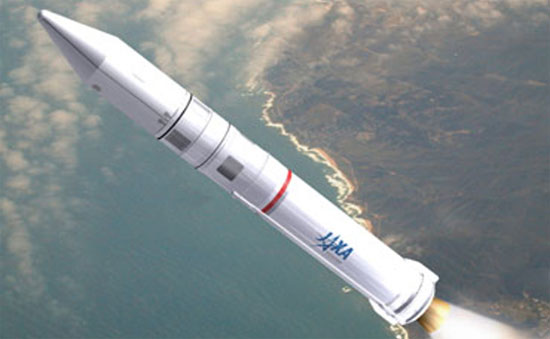Japan is about to launch new generation missiles
Epsilon, Japan's new generation rocket, will fly to space in August.
The launch will take place at Uchinoura Space Center, Kagoshima Prefecture, Japan on August 22, NHK TV station reported. Epsilon is a new type of rocket built by the Japan Aerospace Exploration Agency (JAXA) for the first time in 12 years. It is 24m high, 2.5m in diameter, weighing 91 tons. With these dimensions, it is only half of H2A, the type of missile that Japan is using.

Illustration of the Epsilon rocket flying into space. (Photo: enjoyspace.com)
Japan invested about 20 billion yen for Epsilon research project. New generation missiles use solid fuel. Epsilon can bring small, lightweight artificial satellites into space, and carry out all H2A tasks that are being undertaken.
The goal of the Epsilon manufacturing project is to improve operational efficiency, reduce missile launch costs to improve the competitiveness of the Japanese missile industry. Engineers continued to use the M5 rocket technology seven years ago, while automating the phase control process and using H2A to assist.
The cost of launching Epsilon is about 3.8 billion yen - only half the cost of launching the M5. Start-up time - from the launch of the rocket to the launch pad - is only 7 days, much shorter than the M5's 42-day time. JAXA will continue to improve Epsilon so that the cost of launching is only 3 billion yen or less in the next 4 years.
In the first launch in August, Epsilon will bring a satellite equipped with planetary observation telescopes. Mr. Morita Yasuhiro, project manager of JAXA, expects that, with the revolutionary design of Epsilon, Japan will be one of the leading countries in rocket manufacturing.
- Japan: Missiles fall back to the launch pad in just a few seconds and then explode
- Japan plans to launch a spy satellite
- Video: Missiles carry satellites falling after launch
- Russian missiles fell into the sea immediately after leaving the platform
- Japan launched a spy satellite
- Japan will make intelligent missiles
- How is the 'launcher and forget' weapon other than 'launch and run'?
- SpaceX will launch more missiles than any country this year
- SpaceX is about to put Japan's telecommunications satellite into orbit
- America develops cruise missiles in formation
- Close up of the missile journey from the launch pad, move and hit the target
- Chinese missiles exploded and fell near a village inhabited by people after the launch
 Van Allen's belt and evidence that the Apollo 11 mission to the Moon was myth
Van Allen's belt and evidence that the Apollo 11 mission to the Moon was myth The levels of civilization in the universe (Kardashev scale)
The levels of civilization in the universe (Kardashev scale) Today Mars, the sun and the Earth are aligned
Today Mars, the sun and the Earth are aligned The Amazon owner announced a secret plan to build a space base for thousands of people
The Amazon owner announced a secret plan to build a space base for thousands of people Japan successfully launched missiles using advanced hard fuels
Japan successfully launched missiles using advanced hard fuels  Japan successfully launched the new Epsilon missile
Japan successfully launched the new Epsilon missile  Japan delayed the launch of the Epsilon rocket 19 hours before the scheduled time
Japan delayed the launch of the Epsilon rocket 19 hours before the scheduled time  Japan develops new boosters
Japan develops new boosters  Decode the mysterious star three times bigger than the sun
Decode the mysterious star three times bigger than the sun  Virus steals information about Japanese space rocket
Virus steals information about Japanese space rocket 